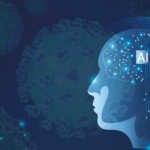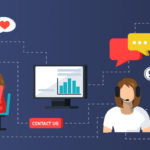Leveraging Human-in-the-loop Machine Learning process to increase e-commerce conversion rates
Machine Learning algorithms can hugely impact the sector of e-commerce by categorizing and recommending…
Looking to know more? Talk to our experts
Learn more about who we are, what we do and what drives us to solve some of the toughest and most complex AI challenges of our clients across multiple industries everyday.
Read MoreMachine Learning algorithms can hugely impact the sector of e-commerce by categorizing and recommending…
In this blog, we’ll explore the Public-Private cloud, rapidly emerging as one of the…
Customers today interact with a brand on multiple mediums, such as calls, text, email,…
Customers today interact with a brand on multiple mediums, such as calls, text, email,…

Zen3 Infosolutions announced yesterday that it has been selected as a Managed Partner by Microsoft. “This marks a deep...

Our continuously growing association with our clients is the result of our commitment to excellence driven by exceptiona...

Just weeks after receiving the Silver partnership, Zen3 Infosolutions become a Microsoft Gold Partner in Application Dev...

Zen3 Infosolutions announced today the Gold Partner recognition from Microsoft in DevOps. Less than 5% of Microsoft’s ...

Just days after achieving Silver Application Development and Silver Data Platform successes, Zen3 Infosolutions celebrat...

Customers today interact with a brand on multiple mediums, such as calls, text, email, chat, and social media. In such a...

To say that the COVID-19 has impaired our lives would be a euphemism. This nanoscopic organism has hampered our business...

Smartphones are almost an integral part of our lives today. They have a reasonable degree of intervention in our daily f...

The customer help desk industry started in the 1970s when businesses decided it would be a good idea to help support cus...

Smartphones are almost an integral part of our lives today. They have a reasonable degree of intervention in our daily f...

Learn more about the workplace where diversity is celebrated, innovation is encouraged and hard work is rewarded.
ExploreThe support, guidance, and training I receive at work not only enable me to perform my job but also help me grow professionally and shape my career.
Srinivas Naidu Senior Software Developer“I won’t be lying if I say that I am yet to experience Monday blues. I look forward to coming to the office every day.
Sriharsha Arvapalli Team Leader - Business Development
The COVID-19 virus has placed tremendous pressure on the global healthcare delivery model. The healthcare sector had little time to prepare and react as the steep rise in cases created severe challenges such as limited healthcare professionals, overrun facilities, limited resources, and increased risk of exposure to medical staff.
While the outbreak is spreading continuously, there has been continued progress in controlling it and artificial intelligence (AI) has been a significant contributor. The role of AI in the healthcare sector is not new. Fortunately, AI has evolved substantially during the COVID-19 pandemic, covering more aspects of healthcare operations than ever before.
A few interesting examples:

Due to COVID-19 outbreak, contact centers are flooded with unexpectedly high volumes of customer calls. Companies need to provide coordinated and real-time responses to key customer concerns in a consistent manner.
Speech analytics is a highly effective solution for this. It enables contact centers to analyze 100% of customer calls in real-time and provide insights for the most critical customer concerns, complaints and provide resolution. Using speech analytics, it is easier to prioritize concerns and provide timely, data-driven responses.

To understand the nature of the novel coronavirus, create a predictive model, and formulate an effective strategy against COVID-19, health care researchers need to go through copious amounts of data. This includes previous research, current and past publications, and decades of epidemiological models, among others. It is not possible to read through all of it to get the required clarity on coronavirus.
Data scientists are applying text analytics to review thousands of research papers within minutes to find the relevant information, sometimes lifesaving, just in time.

The need for voice recognition has picked up with the ongoing pandemic. With only a limited number of doctors interacting with patients over telephone calls, it is quite difficult for them to record issues of every patient and respond to them in a timely fashion.
Now, using voice recognition, doctors can keep track of all the interactions and information shared over telephone calls. A voice recognition software auto-transcribes the recording into text and updates the electronic medical record (EMR) of the patient automatically. This not only reduces the turnaround time of doctors but also helps them to take care of more patients with more accurate results.

Like other industries, COVID-19 has caught the healthcare sector off-guard. Limited medical and healthcare resources are a major challenge in addressing COVID cases growing exponentially. Data analytics is proving to be a tremendous help to healthcare workers as well as researchers.
By gathering data from multiple sources, machine learning models can be trained to assess the risk level of a patient. This allows care providers to arrange limited medical assistance and organize vital resources such as necessary PPE like masks and ventilators. The analytics also enable the identity of already strained physicians to prevent burnout.

Detection of coronavirus at an early stage is crucial to expedite treatment, isolate the patient and control the spread of the virus. Radiologists claim that CT scans offer a fast diagnosis and use high-quality three-dimensional images of the patient’s chest to analyze symptoms. However, this process takes a long time, especially since COVID-19 shares its characteristics with other kinds of pneumonia.
An AI-enabled diagnosis uses computer vision to process hundreds of scans within a few seconds with astounding accuracy. Moreover, the accuracy of the computer vision analysis continues to get better, thanks to deep learning capabilities.

Amid lockdowns, interacting with customers has been a critical challenge for businesses. To solve it, many companies have started to use bots. These bots interact with customers in real-time responding to their queries and help spread awareness among people during the time of the pandemic. Similarly, many organizations are using chatbots to answer the coronavirus-related questions of their employees and to reduce anxieties or provide information.
As businesses resume globally, organizations are wary of leaving any gaps that may lead to their workforce getting infected. A California-based start-up FaceFirst has rolled out a new solution powered by facial recognition.
The solution uses a database run by healthcare providers and notifies about the immunity status of an individual upon facial scanning. It also shares the individual’s history with respect to COVID-19 i.e. tests received, efficacy of tests and whether the individual has been in the proximity of an infected person.
Besides letting the organizations know if an employee is infected, this app helps them know who should be vaccinated with priority.

Besides social distancing, computer vision can also play a highly active role in driving public safety measures through healthy practices. Computer vision systems can be deployed to check whether people are wearing safety masks and what surfaces and objects they often contact. For example, The Yonghe Cardinal Tien Hospital has leveraged Azure Cognitive Services to build an intelligent detection device that scans the body temperature of the people entering the hospital lobby and checks whether they’re wearing masks.
These systems can also identify hot spots so that the spread can be checked by restricting movements and keeping people away from these areas.
AI has been at the forefront in addressing the global crisis of coronavirus. Although it is yet to tackle COVID-19 head-on, in the fight against the pandemic, it has been leading in many key developments including diagnosis, drug discovery, remote trials, patient care, and more uses are sure to happen. Powered by human intelligence, AI plays a vital role in public health improvement and is so valuable to help us in challenging times.